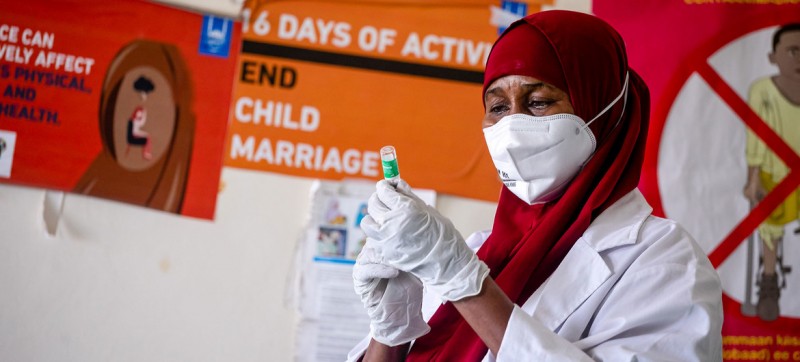Contents
A healthcare worker prepares a COVID-19 vaccine at a hospital in Mogadishu, Somalia. Almost two million cases of COVID-19 were reported in Europe last week, the most in a single week in that region since the pandemic started, according to the World Health Organization (WHO). Almost 27 thousand deaths were reported in the continent last week, more than half of all COVID-19 deaths globally. Speaking to journalists in Geneva, WHO Director-General Tedros Ghebreyesus explained that the virus is not only surging in countries with lower vaccination rates in Eastern Europe, but also in nations with some of the world’s highest vaccination rates in Western Europe. “It’s another reminder, as we have said again and again, that vaccines do not replace the need for other precautions”, Tedros said. “Vaccines reduce the risk of hospitalization, severe disease and death, but they do not fully prevent transmission”. WHO continues to recommend the proportionate use of testing, masks, physical distancing, improved ventilation, and other measures. A ‘must-stop’ scandal
Media briefing on #COVID19 with @DrTedros https://t.co/D0A9dUBXO7
— World Health Organization (WHO) (@WHO) November 12, 2021
“With the right mix of measures, it’s possible for countries to find the balance between keeping transmission down and keeping their societies and economies open”, Tedros assured. “No country can simply vaccinate its way out of the pandemic”.
According to the WHO chief, “it makes no sense” to give boosters to healthy adults, or to vaccinate children, when health workers, older people and other high-risk groups around the world are still waiting for their first dose.
Every day, there are six times more boosters administered globally than primary doses in low-income countries, which Tedros described as “a scandal that must stop now”.
COVAX
The WHO chief also provided an update on COVAX, the UN-led worldwide initiative aimed at equitable access to vaccines.
The tool has now shipped almost 500 million vaccines to 144 countries and territories. And with exception of Eritrea and the Democratic People’s Republic of Korea, all States have begun vaccinating.
“The vast majority of countries are ready to get doses into arms, but they need the doses”, Tedros said.
To reach the target of vaccinating 40 per cent of every country’s population by the end of this year, 550 million doses more are needed – about 10 days’ worth of production. Is this correct Alex?
Measles
The pandemic has had effects on other vaccination campaigns, explained Tedros.
A report by WHO and the US Centers for Disease Control and Prevention, released this week, shows that more than 22 million infants missed their first dose of measles vaccine last year – three million more than in 2019 – marking the largest increase in two decades.
A total of 24 measles vaccination campaigns in 23 countries were postponed because of the pandemic, leaving more than 93 million people at risk.
Compared with 2019, however, reported cases decreased by more than 80 per cent.
“But this decrease is cause for concern, not celebration”, said Tedros, explaining that measures to prevent the spread of COVID-19 may have contributed, noting that lab specimens sent for testing were the lowest in a decade.
“The drop in vaccination, combined with weak monitoring, testing and reporting, create the ideal conditions for explosive outbreaks of measles”, he said.
Diabetes
On Sunday, World Diabetes Day will mark the 100th anniversary of insulin, which has made a deadly disease manageable for nine million people with type 1 diabetes.
For more than 60 million people living with type 2 diabetes, insulin is essential in reducing the risk of kidney failure, blindness and limb amputation.
“The scientists who first discovered insulin a century ago refused to profit from their discovery and sold the patent for just one dollar”, recalled Tedros. “Unfortunately, that gesture of solidarity has been overtaken by a multi-billion-dollar business that has created vast access gaps”.
One in every two people who need insulin for type 2 diabetes does not get it.



